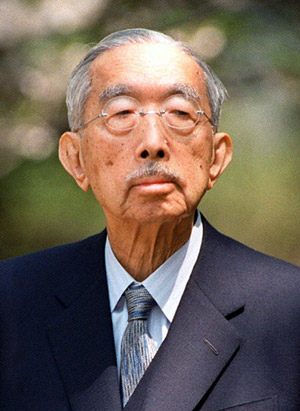TOKYO - A movie painting a "human" portrait of Emperor Hirohito, in whose
name Japanese soldiers fought in World War Two, is set to be shown in Japan for
the first time next month despite fears of right-wing anger.

Japan's late Emperor
Hirohito is seen in this file photo taken 1988 in Tokyo. A movie painting
a "human" portrait of Emperor Hirohito, in whose name Japanese soldiers
fought in World War Two, is set to be shown in Japan for the first time on
August 5, 2006 despite fears of right-wing
anger.[Reuters] |
Revered as a god until Japan's defeat in 1945, Hirohito is still such a
sensitive topic in ultra-conservative circles that the identity of the actor
playing him was kept secret before the movie's release in last year.
More than 18 months after "Solntse" (The Sun) won plaudits for Russian
director Aleksandr Sokurov at the Berlin Film Festival, it will open in Japan on
Aug. 5.
The film's distributor said he had to overcome concerns about pressure from
right-wing groups and conservatives proud of an imperial family they say
stretches back more than 2,000 years.
"People were really worried about the chance of violence from right wing
groups, so companies were fearful of buying the rights," said Michio Koshikawa,
head of distribution firm Slow Learner Ltd., told Reuters.
"But I think the movie will be a good chance to discuss the whole issue of
Emperor Hirohito," he said. The movie will open in only two cinemas, one in
Tokyo and one in the city of Nagoya, central Japan, although Koshikawa said it
could eventually run in as many as 25 theatres.
There is precedent for concern.
The mayor of Nagasaki, which with Hiroshima was hit by an atomic bomb in
August 1945, was shot and wounded by rightists in 1990 after saying Hirohito
bore some responsibility for the war.
Hirohito's role in wartime decision-making has never been fully pursued in
Japan, scholars say, largely due to a decision by U.S. occupation authorities to
keep him on the throne and turn the emperor into a symbol of a newly democratic
Japan.
"In post-war Japanese politics, it was taboo to talk about Hirohito as a
person with potential moral or political responsibility for the war," said
Sophia University professor Harald Fuess.
Hirohito's death in 1989 lifted that taboo and many younger Japanese no
longer give much thought to the royal family, but pointing a finger at the
emperor is still something mainstream politicians are unlikely to do, Fuess
added.
In the movie, which focuses on the emperor's isolation toward the end of the
war, Hirohito is portrayed by actor Issey Ogata as a human figure who insists
he's no different from other people.
But reviews also say he is also shown as timid and child-like, a
characterisation that could prompt controversy.
Director Sokurov said his goal for the movie, the third in a series about
powerful 20th century figures such as Hitler and Lenin, was to look at
Hirohito's humanity.
"This is neither a documentary nor a political film," Sokurov was quoted
telling the English edition of the Asahi newspaper.
"I was interested in Hirohito as a person."
The film's opening comes ahead of several emotive wartime anniversaries
including the Aug. 6 atomic bombing of Hiroshima.
Hirohito became the focus of renewed attention last week after a memo by a
courtier revealed that he stopped visiting the Yasukuni Shrine for war dead
because he was displeased that wartime leaders convicted as war criminals were
honoured there.
The royal family has also grabbed headlines because Princess Kiko, wife of
one of Hirohito's grandsons, is expecting a baby that could be the first male
heir born in more than 40 years.
Distributor Koshikawa said he hoped the film might herald a new era. "Being
able to talk freely about Emperor Hirohito would show that things in Japan had
finally normalised," he said.